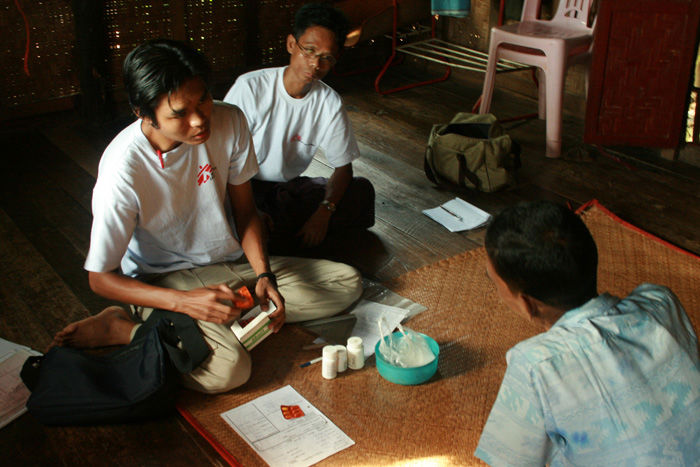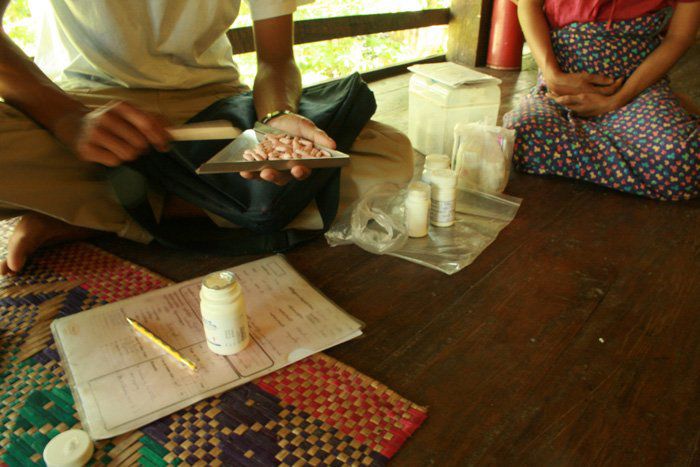Médecins Sans Frontières (MSF) is currently treating patients in its HIV programmes in Myanmar for tuberculosis (TB). The organisation is providing diagnosis, treatment and counselling to around 2,540 TB patients in the country, where it has been working since 1992.
Dawn is just breaking when MSF counsellor AUNG Hein Maw begins his day. Every day, Maw makes the journey to various villages in the Dawei and Myeik districts in southern Myanmar. In the early morning mist, one can just make out the silhouettes of palm trees and women working in the paddy fields. As the driver avoids the potholes, Maw checks his list of patients to visit. Most of them are “defaulters”, or patients who were diagnosed with HIV or TB-HIV co-infection at the clinic, who have either failed to come back for their appointment on time or who have problems adhering to the treatment. For people living with HIV, TB is the most common opportunistic infection, and the main cause of death.
When patients first start on a TB treatment regimen, they should come at least once a month to the clinic so that staff can monitor their progress. However, they don’t always come. “We go and find them in their villages and offer extra support for them to come back for their appointment. Then we follow up and ensure they are taking their drugs correctly,” explains Maw, “but we also visit patients when they are at a critical point of their treatment or are experiencing side-effects and need more support.”
Treating TB-HIV co-infection is a challenge when dealing with a mobile population. In Dawei, home to many migrant workers, MSF runs a HIV clinic, and outreach counsellors play a key role in helping patients adhere to the treatment, which is critical to their recovery. There are currently four counsellors working in villages in Dawei and the neighbouring district of Myeik, where together they track around 300 patients.
The drive from Dawei clinic to these villages can take several hours, and the road is not good. Distance is one reason why patients fail to come back. MSF covers transport fees when patients are too poor to pay themselves, but in most cases there are other reasons why patients interrupt their treatment.
“Sometimes they don’t understand the disease well, or how to take their pills; sometimes they find it hard to come or they need to work. We had cases where people were in denial or scared of discrimination; other times it can be because of the side-effects the drugs can cause,” says Maw.
Little understanding of HIV/AIDS and TB
The population is poor and made up mainly of fishermen and day labourers working in paddy fields or rubber plantations. Most have little understanding of HIV/AIDS or TB.
Maw’s first patient, who we will refer to as “S”, is a man in his fifties. Sitting on the floor of his traditional wooden house, they discuss together how the treatment is going, and Maw counts the pills that are left to ensure the right number has been taken.
When S fell sick with TB he remained bedridden for the first three months of his treatment. Although in much better health today, he hasn’t been able to return to his job as mechanic on a fishing boat, and is supported by his daughter and son who work in Thailand. “When I first got sick I went to a private clinic, and we had to use all our savings to pay the fees. So it’s very important for me to be receiving free treatment now,” says S.
“One of the most common reasons for TB patients to default on treatment is because after a while they feel better and think they are cured,” explains Maw. “They rush back to work and stop coming to the clinic. We really have to explain that it’s very dangerous and could lead to a much more severe form of the disease - drug-resistant TB - where treatment takes at least eight months.”
The biggest provider of antiretroviral (ARV) treatment
There is an estimated HIV prevalence rate of more than one per cent in Myanmar, and the country has one of the highest HIV/TB co-infection rates in southeast Asia. An estimated 250,000 people are thought to be HIV positive and very few can access ARV treatment through the Ministry of Health. MSF is currently the biggest provider of ARV medication in the country, with more than 18,000 patients receiving treatment.
While focusing on direct medical care for people living with HIV/AIDS, MSF also offers general health education and helps prevent the transmission of the HIV virus through voluntary testing and counselling and mother-to-child-transmission prevention programmes. Other services include treatment of sexually transmitted diseases (STDs) as well as psychological and social support to patients.
MSF also offers technical assistance and training for HIV/AIDS care programmes in hospitals, health clinics and homes. Programmes are implemented in cooperation with the National Aids Programme (NAP), UNAIDS, WHO, the National TB Programme, and the National Health Laboratory.
Myanmar: helping patients follow their treatment
23 Nov 20114 Read Time

Field News
Myanmar: "HIV/AIDS is still a taboo subject"
24 Nov 20112 Read Time

Latest News & Stories

